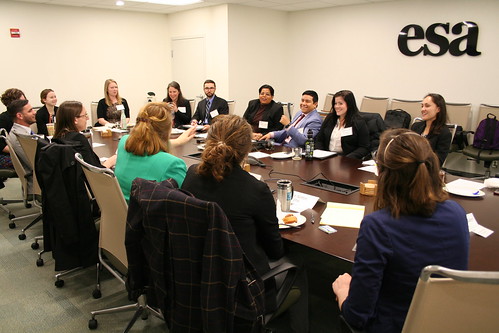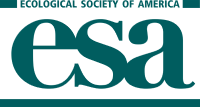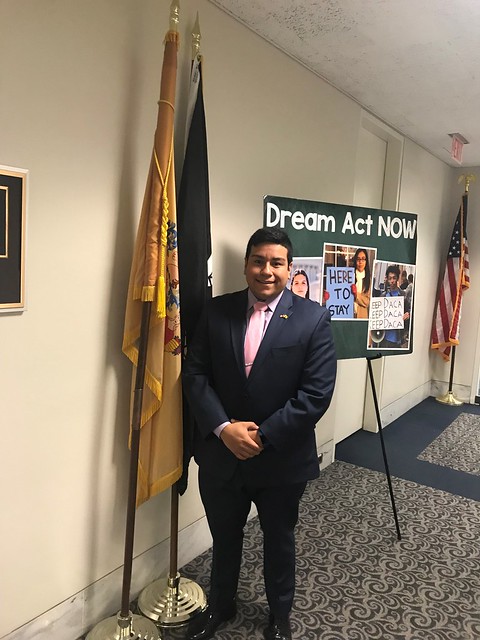Bringing Ecology into Policy Decisions
ESA works to infuse ecological knowledge into national policy decisions, engaging in science policy efforts to inform policy affecting the ecological community and foster support for research and STEM education. We connect our members with policymakers and join with other scientific associations to amplify its messages for policymakers through membership in coalitions, including the Climate Science Working Group, Coalition for National Science Funding, USGS Coalition, NDD United, and National Environmental Coalition on Invasive Species, the Energy Sciences Coalition, the STEM Coalition, the Agriculture and Food Research Initiative (AFRI) Coalition and Friends of the Agricultural Research Service Coalition.
Policy Letters and Statements
ESA issued or co-signed more than 30 letters or statements to policy makers last year. Topics covered include addressing executive orders, federal funding for scientific research, and nominations for key scientific posts in the administration. ESA also joined with other scientific societies to submit comments in the Federal Register about the EPA’s proposed “transparency in science rule” and Waters of the U.S. rule. Several policy statements garnered press as news outlets looked toward scientific societies to contextualize new policies.
ESA and USGS Partnered for a Chesapeake Bay Roundtable Discussion on Capitol Hill
ESA and the U.S. Geological Survey (USGS) held a Capitol Hill roundtable discussion hosted by Congressmen Rob Wittman (R-VA) and John Sarbanes (D-MD) highlighting science used to inform Chesapeake Bay restoration and management. ESA member Denise Breitburg, senior scientist at the Smithsonian Environmental Research Center, moderated the panel. USGS panelists included Scott Phillips, USGS Chesapeake Bay coordinator; Tom O’Connell, director of the USGS Leetown Fisheries Science Center; Ken Hyer, associate USGS Chesapeake coordinator; and Alicia Berlin, research biologist at the Patuxent Wildlife Research Center. Marel King, Pennsylvania director for the Chesapeake Bay Commission and James Davis-Martin, Chesapeake Bay coordinator for the Virginia Department of Environmental Quality also joined the panel to provide perspective on USGS science from the manager’s perspective. Both said that their jobs and their organization’s missions would be impossible to do without USGS science. Long-term data sets from USGS helps these organizations understand trends over time and make decisions. USGS expertise helps them respond to changing conditions and unexpected phenomena. As Davis-Martin said, “Good science is foundational to good management.”
Engaging Members in Policy
Graduate Student Policy Award

ESA brought 10 Katherine S. McCarter Graduate Student Policy Award (GSPA) winners to Washington, DC in April. This annual award provides graduate students in ecology with the opportunity to learn about policy and federal science funding and gain experience engaging in policy and communicating their science. Ten recipients were selected for this year’s award: Vera Pfeiffer (University of Wisconsin, Madison), Jenna Sullivan (Oregon State University), Stephen Elser (Arizona State University), Aaron Baumgardner (California State University Bakersfield), Chelsea Merriman (Boise State University), Steffanie Munguia (Middlebury Institute of International Studies at Monterey), Emily Graves (University of California, Davis), Urooj Raja (University of Colorado, Boulder), Ann Marie Gawel (Iowa State University) and Johnny Quispe (Rutgers University).
GSPA winners met with the offices of 30 members of Congress to request $8.45 billion in funding for the National Science Foundation (NSF) in Fiscal Year 2018. They highlighted how federal investment in scientific research, specifically related to NSF’s biological sciences directorate, benefits the constituents the lawmakers represent.
Capitol Hill Climate Science Day
The Climate Science Working Group (CSWG) held its 8th annual Climate Science Day (CSD), an annual event that brings scientists to Washington, DC to meet with their members of Congress to discuss climate science. As a member of the CSWG, ESA worked with other scientific societies to plan and execute the two-day event, which serves as a non-partisan opportunity for scientists to educate and build relationships with congressional staff.
ESA members Matthew Hurteau of the University of New Mexico and Adam Rosenblatt of the University of North Florida joined nearly twenty other scientists whose work relates to various aspects of climate science to participate in CSD this year. A half-day workshop on Jan. 30 prepared participants for the next day of congressional visits and featured keynote speaker Laura Helmuth, editor at The Washington Post and president of the National Association of Science Writers, as well as a panel of congressional staffers.


